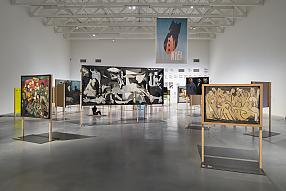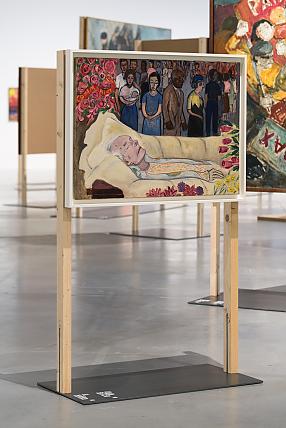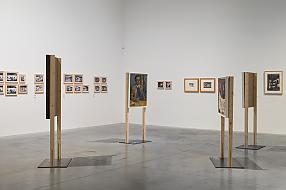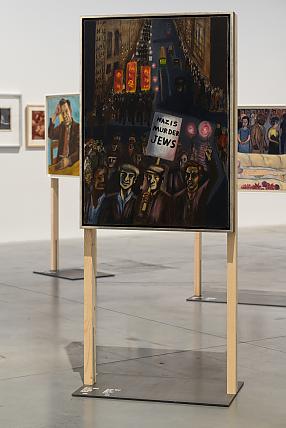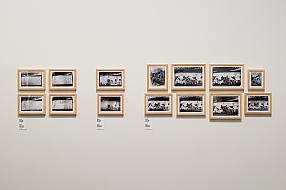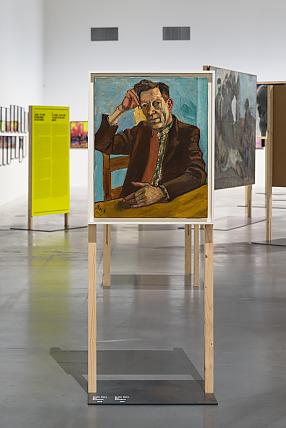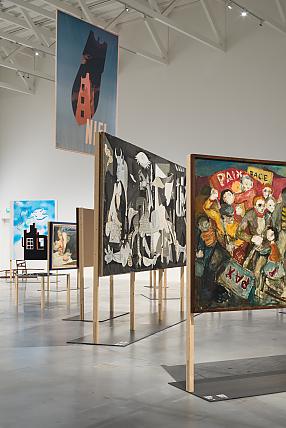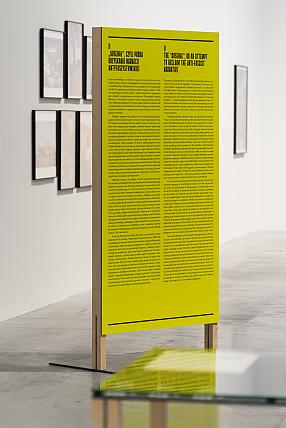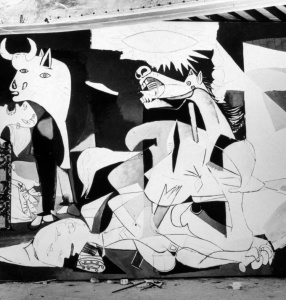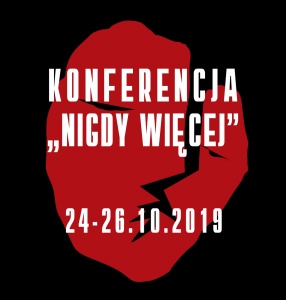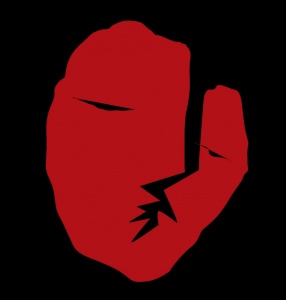Never Again
Art against War and Fascism in the 20th and 21st centuries
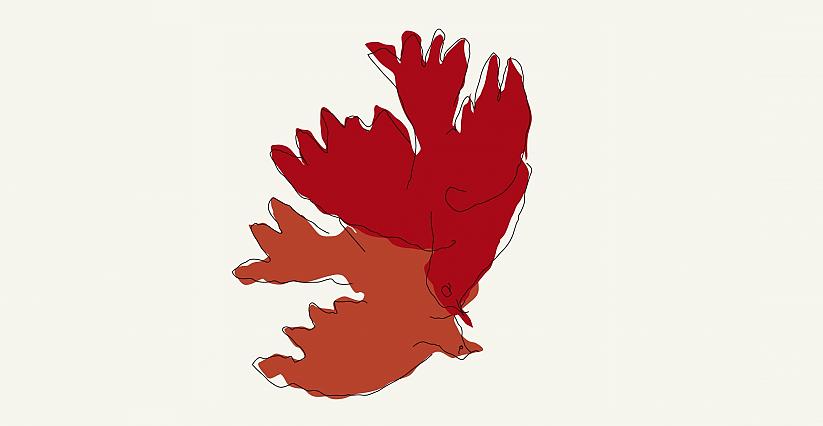
The exhibition “Never Again. Art against War and Fascism in the 20th and 21st centuries”, organised on the 80th anniversary of the outbreak of World War II relies on three precisely determined focal points – Guernica and the 1930s, the “Arsenal” exhibition and the 1950s, contemporary art and (post-)fascism – to present the singular and distinctive tradition of anti-fascist art.
Although the exhibition features primarily historic materials and iconic artworks that shaped the form of anti-fascist and anti-war resistance, the questions posed by the show concern the contemporary era.
We search the rich anti-fascist history for answers to the question about the significance and force of this tradition today. We ask why anti-fascism – as a universalised experience and a peaceful foundation of social life – has lost its consolidating power? Do we no longer fear wars and violence as a fundamental threat to our existence? Did anti-fascism come to an end with communism, with which it was closely linked both in the 1930s and in the 1950s? And can it therefore be successfully pursued further within democratic traditions: liberalism, social democracy? Or is the struggle with fascism (neo-fascism, post-fascism) identical to the struggle with capitalism, which is the essence of the leftist anti-fascist tradition? Finally, how to recount the history of anti-fascism so that it inspires today’s social movements that aim to counter violence?
The exhibition concentrates on three moments in history. The first is the decade of the 1930s: we look at the most renowned anti-war painting, Pablo Picasso’s Guernica from 1937, presenting the history of its creation and reception, which reflects in a distinctive and dramatic way the entanglement of art and politics since the 1930s. We also depict the international anti-fascist movement prior to the outbreak of World War II and its ties with the workers’ movement on the example of artists from the Weimar Republic, the Krakow Group and leftist movements in the United States. The second discussed period is the communist era in Poland, when anti-fascism and pacifism were given official prominence – this section of the exhibition concentrates primarily on the “Arsenal” – Polish National Exhibition of Young Visual Arts “Against War, Against Fascism”, held within the 5th World Festival of Youth and Students in 1955. The harnessing of anti-war stances by the communist propaganda apparatus of that era resonates until the present day in discussions concerning the traps and duties involved in the civic – or even downright political – engagement of artists. The third focus of the show embraces today’s approaches to fascism, which ceases to be treated exclusively as a historical ideological formation responsible for genocide, but is evoked in the context of the modern-day racist, misogynistic and violent narratives that prepare the ground for the catastrophes of the first half of the 20th century to happen again. A major role for that matter is also played by the crisis of the European Union, the greatest peace project in the history of the continent (a response to the events of World War II, driven by faith in humanism and universalism in the new political order), and by the sprawling wave of populisms.
“Never Again. Art against War and Fascism in the 20th and 21st centuries” identifies iconic images and key aspects of the anti-fascist tradition throughout the above moments in history. We use images as a prism through which to portray the complexity of the anti-fascist stance and the variety of approaches to the problem: from political satire and testimonies of atrocities, to apocalyptic forecasts and visual propaganda, to more ambiguous abstract articulations of pro-democratic and anti-authoritarian content. We highlight the moments of self-reflection, the self-awareness of the entanglements of the anti-fascist movements, which are visible in seminal artworks, such as Guernica, or at moments of crisis, such as the “Arsenal” exhibition. We embrace studies on the history of images that accompanied the anti-fascist movements as a tool to understand today’s stances and activities that define themselves as egalitarian and pro-democratic. We look at works by contemporary artists, such as Hito Steyerl, Nikita Kadan and Wolfgang Tillmans, in search of evidence of the continuity of the anti-fascist tradition, we ask about its effectiveness in the face of such phenomena as the acceptance of hate speech, post-truth, the escalation of acts of violence, the return of aggressive nationalism and populism. At the same time, we discern the weaknesses of such “safety fuses” of peaceful order as liberal democracy and the European Union.
What images are able to affect the imagination, organise resistance, initiate constructive community projects? Is it the language of critical art? Are these strategies that deploy the iconography of popular culture, fashion, enter the mainstream? We also ask about the role of propaganda – as a manner in which the work affects the viewers’ emotions and attitudes, but also as a tool of civic pro-democratic mobilisation. We reconsider the very definition of fascism. Highlighting the differences between historical circumstances, aware of the deficits of the anti-fascist tradition, we seek contemporary, communicative and effective art that speaks against war, against fascism.
The exhibition presents works by such artists as – in the 1930s: Maja Berezowska, Alice Neel, Dora Maar, George Grosz, John Heartfield, Jonasz Stern, Leopold Lewicki, Sasza Blonder, Adam Marczyński, Bolesław Stawiński, Bronisław Wojciech Linke, Stanisław Osostowicz; – in the 1950s: Izaak Celnikier, Alina Szapocznikow, Jerzy Tchórzewski, Erna Rosenstein, Marek Oberländer, Jan Dziędziora, Jerzy Tchórzewski, Tadeusz Trepkowski, Waldemar Cwenarski, Wojciech Fangor, Andrzej Wróblewski, Xavier Guerrero; – today: Alice Creischer, Nikita Kadan, Forensic Architecture, Jonathan Horowitz, Goshka Macuga, Mario Lombardo, Mykola Ridnyi, Hito Steyerl, Martha Rosler, Raymond Pettibon, Wilhelm Sasnal, The Society of Friends of Maxwell Itoya and Wolfgang Tillmans.
The show is also part of Our Many Europes, a project of the museum confederation L'Internationale, co-financed from the funds of the EU Creative Europe Cultural Programme. The members of L'Internationale: Museum van Hedendaagse Kunst Antwerpen (MHK A), Antwerp; Moderna galerija (MG+msum), Ljubljana; Van Abbemuseum, Eindhoven; Museu d'Art Contemporani de Barcelona (MACBA), Barcelona; Museum of Modern Art in Warsaw; SALT, Istanbul and Ankara; Museo Reina Sofía, Madrid as well as their partners: National College of Art and Design (NCAD), Dublin and Valand Academy (University of Gothenburg) jointly carry out more than forty public projects (conferences, exhibitions, workshops) between 2018 and 2022.
Curators
Sebastian Cichocki, Joanna Mytkowska, Łukasz Ronduda, Aleksandra Urbańska
Project management
Aleksandra Nasiorowska, Szymon Żydek
Exhibition architecture
Johanna Meyer-Grohbruegge
Key visual
Bureau Mario Lombardo
Graphic design of the publication
Magdalena Heliasz – Print Control
Managing editor
Katarzyna Szotkowska-Beylin
Artists’ biograms
Jakub Depczyński, Bogna Stefańska
Editing
Kacha Szaniawska, Chris Smith
Graphic design of the exhbition and the brochure
Piotr Chuchla
English translation
Łukasz Mojsak
Promotion
Magdalena Kobus, Iga Winczakiewicz, Magdalena Zięba-Grodzka
Conservation and restoration
Michał Kożurno, in collaboration with Monika Bzura
Public program coodrinator
Paweł Nowożycki
Educational program
Paweł Brylski, Dominika Jagiełło, Marta Przasnek, Marta Przybył, Cezary Wierzbicki, Jolanta Woch, and „Use the Museum” team
Realization
Jakub Antosz, Marek Franczak, Piotr Frysztak, Szymon Ignatowicz, Artur Jeziorek, Jan Jurkiewicz, Paweł Sobczak, Marcin Szubiak, Michał Ziętek
Cooperation
Mariia Beburiia, Zofia Czartoryska, Joanna Kasperowska, Andrzej Kowalski, Hubert Kowalski, Agnieszka Kosela, Katarzyna Król, Dagmara Rykalska, Anna Nagadowska, Marta Styczeń, Katia Szczeka, Joanna Szulc, Aleksy Wójtowicz
